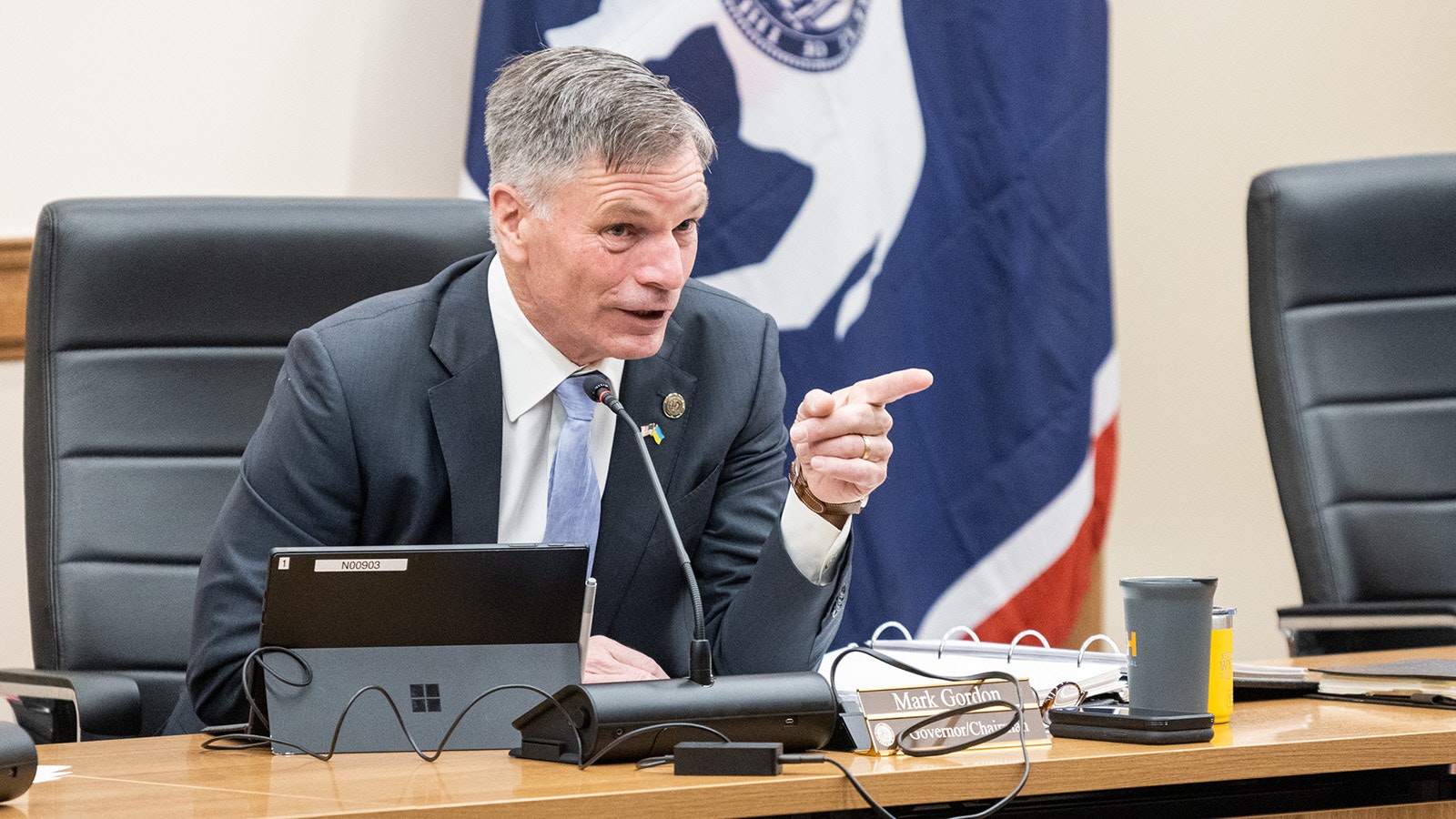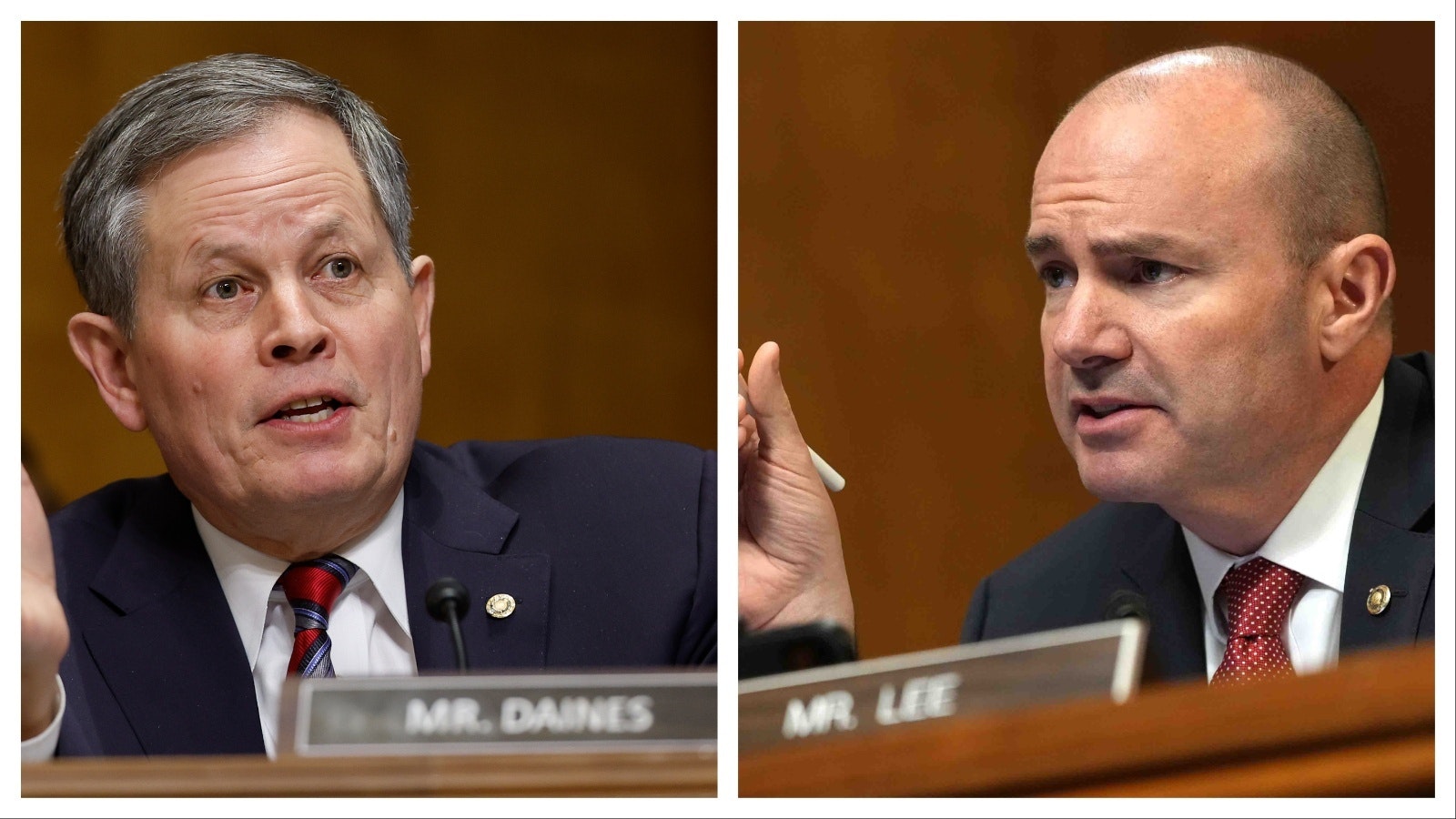During his speech before the second Governor's Mental Health Summit on Tuesday morning in Casper, Gov. Mark Gordon lamented those who oppose funding Wyoming’s two 988 suicide call centers.
When the Legislature convenes again next year for its budget session and discusses permanently funding the 988 program, Gordon said he hopes he doesn’t hear that communicating to someone over the phone won’t prevent them from committing suicide.
“The highest volume of calls we have seen has been in the last year, and we’ve also seen a lot of interventions that have worked,” he said. “When somebody tells you phone calls don’t make a difference, tell them they're full of beans.”
Gordon said when he hears people comment that mental health issues can be solved with volunteerism and private support, he challenges them to write a check immediately.
“Don’t just put it off on somebody else to fund,” he said about the challenge of paying for a growing need for mental health support.
How To Address
Senate President Ogden Driskill, R-Devils Tower, almost immediately started choking up during his short speech in which he expressed frustration about not being able to fund the 988 trust during this year’s session.
A bill was proposed during the 2023 Legislature setting up a $46 million trust fund to permanently support the call centers. All of the funding was removed from the trust fund in the State House on Jan. 20.
“That’s painful folks, that’s painful because that says you’re not willing to deal with something,” Driskill said.
Driskill said he struggles dealing with the mental health issues facing the state and watching people he knows, old and young, die from suicide.
“It affects us all,” Driskill said. “That’s how this state works.”
He sees the Mental Health Summit as a guide for future legislation, imploring those in attendance to tell him what they need.
Wyoming Supreme Court Chief Justice Kate Fox said she felt like Driskill was speaking directly to her.
“Let's go out and figure out how to make those ideas work,” Driskill said. “If you don’t have happy people nothing else matters.”
Wyoming Needs An ‘Awakening’
House Speaker Rep. Albert Sommers, R-Pinedale, believes there is an “awakening” happening with mental health issues in Wyoming.
But he also commented on certain legislators saying it’s not the role of government to wade into mental health, a viewpoint he disagrees with. Although some Republicans expressed support for the overall goal behind the call centers, they also voiced doubt that they would effectively reduce suicides in the state.
“What doesn’t work is not trying,” Sommers said. “I know darn well that doesn’t work.”
‘Too Expansive’
Many members of the Wyoming Freedom Caucus opposed spending on mental health and public health services projects during the 2023 Legislature.
Rep. John Bear, R-Gillette, chairman of the Freedom Caucus, told Cowboy State Daily in January that state government has an obligation to take care of people in crisis, but he’d like to see a more fiscally conservative approach to adding mental health programming.
“I think government has grown too expansive, and in particular the (Wyoming) Department of Health,” said Bear.
The Wyoming Department of Health has the largest budget of any state agency at about $2 billion a year in operating costs, a figure comprising both state and federal money with each making up roughly half of the total.
Some members of the Freedom Caucus have argued that the Legislature must address larger societal issues before it can effectively solve a mental health crisis.
Gordon countered that Wyoming doesn’t have the luxury to relax in addressing mental health crises that affect residents.
Wyoming has the highest suicide rate in the nation and has been one of the highest, if not the highest, in this statistic for at least a decade.
Lower taxes, fewer business regulations and other economic boons tend to raise morale across the country, Bear said in January.
“When the government creates a miserable existence by overtaxing, creating inflation, printing money – you create a situation where people are going to feel hopeless,” he said.
Out-of-State Influences
Gordon said the Wyoming Legislature is heavily motivated by out-of-state influences and pressures, describing these as “petulances.”
“Now you just forward what someone else wrote, and that serves for being astute politically,” Gordon said. “For some in this state, we have lost the fact that we are a community. We are a people who need to watch out for one another.”
It echoes what he said in March when the governor said out-of-state influences were affecting the bill making process and the types of bills sent to his desk.
Fox News and other conservative-leaning news outlets covered Sommers’ decision to keep certain bills in his drawer, likely spurred by the Freedom Caucus heavily publicizing the Speaker’s decision.
“We need to tell them, put that back on Fox News, put that back with what is a Chinese-supported paper and let’s not have that here,” Gordon said. “Our state, our people, and we’re going to make a difference here.”
Gordon’s comments received a long applause from the audience.
Personal Loss
A heavily rural state, Wyoming faces unique challenges when trying to protect its vulnerable people, a topic Sommers is particularly passionate about.
During his speech, Sommers also choked up, saying that, “I’ve lost so many people in my life.”
In his community of Pinedale, an annual Boulder Roll Poker Run car show and motorcycle ride is held to support suicide awareness and prevention.
Gordon said he will always remember two of his children’s classmates who killed themselves. His voice trembled as he described the death of one, a sixth-grade child, as a personal failure on his part as a parent to have not recognized the risk.
“Why couldn't we have made a bigger difference? Why couldn’t we of helped?” he questioned of the deaths.
Relationships, Gordon said, is what he finds defines Wyoming, citing the friendships he shares with Driskill, Sommers and former legislator and Chief of Staff Drew Perkins.
“What’s wonderful about Wyoming … is we’re a tight-knit community,” Gordon said, “and today we are going to be the community.”
He said Wyoming has potential to have some of the most productive conversations about mental health in the country because of its culture. Driskill agreed, describing Wyoming “as a big town with long streets.”
Kemmerer ‘Profoundly’ Impacted
Republican Sen. Fred Baldwin said by the time a 14-year-old died of self-inflicted wounds in his hometown of Kemmerer last year, the act had already become a nearly annual event in his community of 2,422. Baldwin said the event sparked a conversation in Kemmerer that has been mirrored in conversations statewide.
Baldwin said EMS responders in his community, a workforce sector depleted by low staffing, were “profoundly” impacted.
“It’s a huge thing to work on somebody you know, your kids go to school with them, they know your family, they’ve eaten lunch in your house, you go to church with them,” Baldwin said. “It affects you not just today or next week, but down the road.”
Gordon also shared a story of a Wyoming child who witnessed a friend die in an ATV crash.
“Without a community, without friends, without a community to support you, the crisis that young man could’ve gone through,” Gordon said. “He’s still working on it, it's not something you ever get away from.”
Gordon said it takes a community approach to effectively address mental health.
He reflected on his upbringing in his hometown of Kaycee, a town that may not have had all the resources to deal with mental health, but did have a sense of caring for one another. Although he said this may come off as a “utopian” concept, it is the goal that Wyoming should strive for.
“People who have crises one way or another need to feel a part of their community, they need to feel like they belong,” he said.
Gordon said when a mental health hold is placed on someone and treatment follows, it can be challenging to help those people reemerge and succeed in society without them falling into another mental health arrest.
“We have this vicious circle that just ends up costing us more,” Gordon said. “We need to recognize there is a continuity to how we treat people.”
Answers In The Judiciary
Gordon said cooperation between the three branches of government is essential to addressing mental health issues.
“We need to come together to address a very complicated, very expensive and growing problem,” he said.
Fox said around 86% of the inmates in Wyoming penitentiaries have substance abuse issues.
“We spend a whole lot of money in the criminal justice system, in the Judicial branch, trying to manage what are mental health issues,” she said.
The biggest hurdle she sees in her branch is lacking is funding.
“We need money,” she said, drawing laughter from the audience.
Fox said it has become apparent to the Judicial branch it can no longer be isolated, and it is starting to take a more active approach to addressing mental health issues. She said courts have become emergency rooms for all of society’s ills.
“Even if as judges we’d prefer not to be social workers, that is the reality,” she said. “We’re doing a lot of things, but we need to do a lot more.”
Fox said by providing diversion resources like housing, health care and unemployment to mentally vulnerable adults, it could save the state resources in the long run. She said there are some enthusiastic judges in Gillette who would like to see a pilot program enacted like this, which she believes would prevent many people from ever entering the criminal justice system.
She also mentioned the Climb Wyoming program, which helps single mothers in crisis develop tools to overcome stress and poverty to find stability.
Fox said one approach the Judiciary has been taking to solving these issues is directing more patients to outpatient evaluations. She said although this may save money up front, it doesn’t solve the bigger problems.
“That we are arresting and incarcerating people for low-level crimes, misdemeanors, whose real underlying issue is substance abuse,” she said.
Rep. Lloyd Larsen, R-Lander, said there are conversations happening about providing telehealth services to jails to address some of the mental health issues inmates face.
When people are placed on a mental health hold in Wyoming, they often must wait days or even weeks in a local county jail before there is an opening at the Wyoming State Hospital in Evanston or Wyoming Behavioral Institute in Casper.
Often, Larsen said, these patients aren’t provided immediate mental health services in jail, leading to a further decline in their already reduced mental state.
Follow The Votes
Larsen said he hears Fox, but wants the most effective source for resources identified first.
Gordon had a more pointed perspective.
“The money will come if the people have the will to make sure that comes,” Gordon said. “That comes from people showing up at the ballot box.”
Baldwin described the 2023 Legislature as “a difficult year,” saying it was a “mixed bag” for mental health. A physician’s assistant in his professional career, Baldwin is deeply connected to the issue of mental health. He’s also a chairman of the Senate Health, Labor and Social Services Committee.
On the seven mental health bills he passed, Baldwin said there were consistent vote margins on each.
“There is a very strong group of people, a strong group of legislators, that don’t feel the mental issues we have in front of us don’t think they're as important as the rest of us”
He encouraged the audience to pressure these legislators.
Baldwin mentioned high schoolers who gave testimony on a bill that extended postpartum Medicare coverage for new mothers. He said there was one particular senator who was on the fence about supporting the bill before the youths convinced them.
“One testimony, from one 17-year old, made a difference,” he said.
Larsen had a more optimistic view, saying the state was able to restore funding and services to some of Wyoming’s most vulnerable Medicare populations.
The Wyoming Department of Health cut roughly $112 million of its budget during the early stages of the pandemic.
“If you look at any one source of spending in our supplemental budget this year, it was really to help these populations to be able to receive these services I think we as a state agree are warranted,” he said.
Larsen said it doesn’t do the Legislature any good to determine the state’s role in mental health without input from the state’s mental health staff force.
“We need to be able to have very frank conversations with them, because they are the ones receiving the calls from you,” he said to the audience.
Right Solutions For The Problems
Baldwin said collaborative care will be critical for Wyoming moving forward, and he believes physical care and mental care are interconnected.
“If we got to work on one, we’ve got work on both,” he said.
Baldwin used the analogy of a raging river, saying suicide risks need to be solved upstream before a life is lost down the river. Baldwin said this will be a focus for him on the newly created State Legislature Mental Health and Vulnerable Adults Task Force.
Gordon said there is a cohesive feeling the state could do a better job addressing mental health issues. But he also believes there is no one-size-fits-all answer for solving these problems, saying it will take substantial teamwork and coordination.
“But money doesn’t solve everything- vision, care, commitment and effort can make a huge difference,” he said. “The waterfront on mental health is really huge.”
Larsen said a foundation has been laid for understanding mental health issues in Wyoming. Although there is a reactive nature to many of the programs Wyoming is implementing, he said the long-term goal is reaching prevention.
Addressing children’s mental health is a topic Sommers believes is the biggest facing Wyoming.
“There’s no silver bullets in this,” he said.
Larsen said he will look to focus on the Task Force and in collaborations with the Judiciary Committee on ways to better identify at-risk K-12 children who may commit self-harm. Gordon said teachers need much more support as do veterans of all ages in Wyoming.
“I do believe that Wyoming has woken up to that we need to address mental health and we’re making progress,” he said.
He said this body will in some ways serve as a subcommittee below the Judiciary Committee that can provide ideas and inspiration for bills that would be adopted by the standing joint committee.
“The Task Force has the ability to be a little more nimble,” he said.





